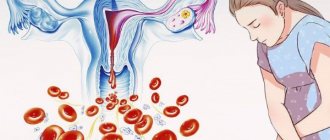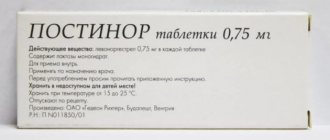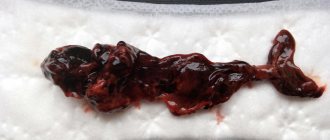The nature of menstruation during menopause
Menopause includes three periods: premenopause, menopause and postmenopause.
Premenopause is the initial period of suppression of the reproductive function of the female body. It is characterized by a gradual decrease in the sex hormones estrogen and progesterone. This period lasts on average 3-6 months.
Menopause - during this period, the ovaries stop producing hormones or secrete them in small quantities. It is installed if there is no menstruation for more than 12 months.
Postmenopause is the final stage when the appendages atrophy and are unable to recover. Occurs 3 years after the onset of menopause.
When menstruation appears during menopause, the doctor will definitely find out what stage of involution of the reproductive system the patient has. Thus, the following changes are typical for different periods:
- premenopause - estrogen secretion begins to decrease. Gradually, the cycle fails, with an increase or decrease in the interval between ovulation, it occurs irregularly. Due to a deficiency of hormones, discharge becomes scanty, insignificant, but sometimes, on the contrary, more abundant than before. Many people note a deterioration in their health: headaches, increased blood pressure, dizziness, severe abdominal pain. Heavy discharge is dangerous to health and requires immediate medical attention;
- menopause - menopause is characterized by a complete absence of ovulation. Due to estrogen deficiency, egg development does not occur. The onset of menopause usually means that premenopause is still ongoing. Heavy discharge occurs due to serious illnesses, so it is not recommended to postpone a visit to the doctor;
- postmenopause - there is no monthly cycle, estrogen is not secreted, ovarian tissue is replaced by connective tissue.
When do the first critical days occur?
A few decades ago, girls began menstruating at almost 18 years of age. Nowadays puberty comes earlier. The occurrence of the first menstruation at 11–16 years of age is considered normal. For some girls, their periods come earlier, and for some, later.
This depends on several factors:
- diseases that were suffered in childhood;
- heredity;
- nutrition;
- living conditions;
- physical development.
In addition, if the grandmother and mother started their periods early, then the child will most likely do the same. If a girl is ahead of her peers in physical development, then her period will come earlier. Conversely, if the baby grows up weak and often gets sick, then she will probably lag behind in puberty. Menstruation will occur later due to poor nutrition, deficiency of vitamins and nutrients necessary for the growth and development of a young body.
There are cases where girls' first periods begin at 8–9 years old. Early sexual development can be caused by hormonal imbalance and heavy physical exertion. If menstruation has not begun by the age of 17, then this is a reason to visit a gynecologist. The reason for delayed sexual development may be insufficient functioning of the ovaries, emotional stress, nervous overload, problems with hormonal metabolism, disorders arising from the pituitary gland, grueling sports training, unfavorable environmental conditions, and dieting.
Signs preceding the first menstruation
Any mother who monitors the condition and health of her daughter can notice the signs that precede the onset of the first menstruation. It is from this moment that we need to begin preparing the child for a new period of life. About a couple of years before the onset of menstruation, a girl’s figure changes (breasts enlarge, hips become wider). Hair begins to grow under the arms and on the pubic area. In addition, girls' periods are preceded by acne on the face and back.
A few months before the first critical days, girls notice traces of atypical discharge on their underwear. They may be transparent, yellowish or whitish without an unpleasant odor. All this is normal and does not indicate any disease. If you experience symptoms such as itching in an intimate place, a strange smell inherent in the discharge, then you should visit a specialist.
A few days before the start of menstruation, a girl may show signs of premenstrual syndrome (PMS), which occurs in adult women:
- frequent mood swings, tearfulness;
- apathetic or aggressive state;
- headaches that occur for no reason;
- nagging pain localized in the lower abdomen.
Features of menstruation
At the onset of menopause, patients notice that menstruation proceeds differently than before. Usually it is mild or of a spotting nature. Symptoms of menstruation at the beginning of menopause are accompanied by hot flashes, emotional instability, general malaise and other manifestations of menopause. For some, their character does not change during premenopause.
The amount of blood released decreases significantly, up to complete absence. Possibly asymptomatic or with a significant deterioration in well-being.
Important! Despite the age-related changes that occur, amenorrhea in the first two periods of menopause does not mean that a woman has completely lost the ability to become pregnant. The ovaries continue to alternately secrete hormones for several more years and sometimes eggs mature in them.
In postmenopause, amenorrhea is considered normal.
Abundance
Due to inadequate functioning of the ovaries and their atrophy, the volume of menstrual blood is usually reduced. In rare cases, it increases slightly, but heavy bleeding is a sign of dangerous conditions and diseases
- endometriosis;
- myoma;
- polyps;
- hormonal disbalance;
- neoplasms;
- vaginitis;
- hyperplasia.
What to do
If your period lasts for more than a week, then on the 10th day we recommend that you immediately consult a doctor. Timely diagnosis identifies possible pathologies at an early stage. If changes are detected, the professional will prescribe a treatment regimen and prescribe medications. It is forbidden to engage in independent therapy, since relief of symptoms will lead to complications.
Bleeding can go on for quite a long time if it is not stopped, and this fact is in no way a good thing for a woman’s health.”
On the 10th day of menstruation, it is recommended to reduce the amount of discharge. As first aid, special hemostatic drugs are taken.
- Vikasol. It is an analogue of vitamin K and improves the quality of blood clotting. If no changes occur within 24 hours, then the reason is not a lack of minerals.
- Etamzilat. Normalizes vascular permeability, helps the formation of thromboplastin and reduces the intensity of blood secretion.
- Diction. A powerful hemostatic agent that helps with intense discharge.
Remember: each drug has many contraindications, which are indicated in the instructions. After eliminating the symptoms, you should definitely consult a doctor to find the cause of the pathologies. If your period lasts more than 8 days, then on the 10th day you should not self-medicate. Timely medical assistance will save you from subsequent problems. A professional will prescribe a vitamin complex to restore the body after blood loss, as well as special products to strengthen the walls of blood vessels.
If your periods take a long time, then traditional medicine recommends using a tincture of water pepper. An inexpensive and accessible natural preparation has a gentle effect on blood vessels and accelerates clotting. The dose is prescribed by the attending physician, and contraindications are kidney disease and inflammatory processes in the genitourinary system.
If your period lasts more than 8 days, then on the 9th or 10th day, doctors advise using nettle infusion. The plant even copes with postpartum bleeding and replenishes the supply of vitamins that leave the body along with the blood.
An increase in the duration of menstruation is a signal that should force a woman to focus on her health. Do not self-medicate, but immediately seek help from a specialist. We recommend that you reconsider your lifestyle and stop exhausting yourself with strict diets or physical activity. Protect yourself from stress and hassle, and you will forget about pathologies when your periods take a long time.
We recommend reading about this topic
Period lasts more than 9 days
My period has been going on for more than a week. about 10 days
Popular articles in the “Menstruations” section
- Your period lasted 3 days instead of 6: the main reasons
- Why did my period start 14 days after the previous one?
- Causes, symptoms and treatment of weak periods (hypomenorrhea)
- How to reduce bleeding during menstruation?
- The main reasons for scanty periods when taking birth control pills
- Early miscarriage, how to distinguish it from menstruation?
- Reasons why periods last 2 days
Subscribe Stay up to date with new products on our site
(c) 2021 Women's diseases
Copying materials is permitted only with an active link to the source
Questions and suggestions
Consultation with a doctor on the use of any drugs and procedures posted on the site is mandatory.
https://youtu.be/xTJMDWE7CAo
Symptoms of the onset of menopause with regular menstruation
In some patients, normal ovulation continues until menopause and postmenopause. With such a transition to menopause, there is no typical picture of slow involution of the reproductive system. It is possible to diagnose menopause based on the symptoms of the onset of menopause that appear during regular menstruation. Most often it is accompanied by the following symptoms:
- hot flashes during menstruation - a feeling of heat, increased sweating, a feeling of stuffiness, abruptly changing to chills;
- headaches, dizziness;
- increased blood pressure;
- decreased libido;
- emotional instability - sudden changes in mood, irritability, tearfulness, depression.
Causes of menstruation during menopause
Depending on the age of the woman, there are different reasons for the onset of critical days after menopause. Of course, it will not be possible to determine the cause only based on age, but taking into account statistical data, we can assume the most typical causes for this age:
- 40-44 years - often normal, regular ovulation is a sign of the full functioning of the appendages. In women over 40 years of age, reproductive function may be intact. Changes in the nature of discharge and disruption of the menstrual cycle are a sign of the onset of perimenopause;
- 45-49 years - most often, critical days after 45 become scarcer, ovulation is irregular due to the onset of menopause. With normal functioning of the genital organs, their character does not change. An atypical course is a consequence of gynecological and endocrine diseases: diseases of the adrenal glands and thyroid gland, polyps;
- After 50 - often at this age menopause begins with the transition to postmenopause. Any bleeding is not typical for this age; it occurs due to various diseases: ovarian cancer, fibroids, endometriosis, polyps, pathology of endocrine organs and systems, and others. With late onset of menopause, menstruation is normal.
When to see a doctor
They talk about the properties of the first menarche, it is worth touching on the question of what they should not be:
Excessively abundant
Let us repeat: the normal duration of the first discharge should not exceed 7 days. Typically this period ranges from 2 to 5 days;
Have a pungent odor
Menarche. like critical days during a woman’s life, they have a characteristic faint aroma. The presence of a sharp, putrid odor is a signal to immediately visit a doctor;
There is severe pain
Menstruation may be accompanied by moderate pain in the tailbone and abdomen in the first days. You should worry if the pain is sharp and intolerable. This phenomenon may indicate not only pathology in the organs of the reproductive system. But also about untreated cystitis or other diseases of the kidneys and urinary tract.
Presence of foreign inclusions
The debut discharge is homogeneous. A minimum amount of mucous blood cells familiar to women is allowed. Splashes of yellow, green or dark brown color should alert the girl and serve as a reason to visit a specialist;
The spot should not appear several times a month.
How to stop heavy menstruation?
If the bleeding is too heavy and does not stop, this is a sign of uterine bleeding. Only a doctor can determine how to stop menstruation if it has been going on for a long time after conducting the necessary examination.
Only a gynecologist-endocrinologist can prescribe hormonal drugs. Before doing this, he identifies the cause of the violations. To do this, they check the level of estrogen and progesterone, perform an ultrasound examination of the pelvic organs, do a coagulogram and a general blood test, and examine the vagina and cervix.
What to do
If your period lasts for more than a week, then on the 10th day we recommend that you immediately consult a doctor. Timely diagnosis identifies possible pathologies at an early stage. If changes are detected, the professional will prescribe a treatment regimen and prescribe medications. It is forbidden to engage in independent therapy, since relief of symptoms will lead to complications.
Bleeding can go on for quite a long time if it is not stopped, and this fact is in no way a good thing for a woman’s health.”
On the 10th day of menstruation, it is recommended to reduce the amount of discharge. As first aid, special hemostatic drugs are taken.
- Vikasol. It is an analogue of vitamin K and improves the quality of blood clotting. If no changes occur within 24 hours, then the reason is not a lack of minerals.
- Etamzilat. Normalizes vascular permeability, helps the formation of thromboplastin and reduces the intensity of blood secretion.
- Diction. A powerful hemostatic agent that helps with intense discharge.
Remember: each drug has many contraindications, which are indicated in the instructions. After eliminating the symptoms, you should definitely consult a doctor to find the cause of the pathologies. If your period lasts more than 8 days, then on the 10th day you should not self-medicate. Timely medical assistance will save you from subsequent problems. A professional will prescribe a vitamin complex to restore the body after blood loss, as well as special products to strengthen the walls of blood vessels.
If your periods take a long time, then traditional medicine recommends using a tincture of water pepper. An inexpensive and accessible natural preparation has a gentle effect on blood vessels and accelerates clotting. The dose is prescribed by the attending physician, and contraindications are kidney disease and inflammatory processes in the genitourinary system.
If your period lasts more than 8 days, then on the 9th or 10th day, doctors advise using nettle infusion. The plant even copes with postpartum bleeding and replenishes the supply of vitamins that leave the body along with the blood.
An increase in the duration of menstruation is a signal that should force a woman to focus on her health. Do not self-medicate, but immediately seek help from a specialist. We recommend that you reconsider your lifestyle and stop exhausting yourself with strict diets or physical activity. Protect yourself from stress and hassle, and you will forget about pathologies when your periods take a long time.











